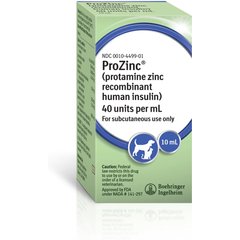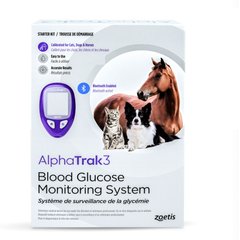What Is Diabetes in Dogs? What Are the Signs?

Photo by Chewy
Just like humans, dogs can develop diabetes, which is a metabolic disorder that leads to chronically high blood sugar levels.
And while diabetes in dogs requires lifelong management, early detection can make all the difference. By catching the disease early and providing ongoing treatment and care, dogs with diabetes can continue to live their best, tail-wagging lives.
We spoke with two veterinarians to better understand why diabetes develops, the signs to watch for, how it’s treated, and more.
What Is Diabetes in Dogs?
Diabetes mellitus in dogs is an endocrine disorder where the body either fails to produce enough insulin or can’t properly use the insulin it does produce.
Insulin is a vital hormone responsible for regulating blood sugar (glucose) levels, and when it’s insufficient or ineffective, glucose builds up in the bloodstream, leading to high blood sugar levels.
This disease is relatively common in dogs, affecting an estimated 0.32–0.36% of the canine population. Type I diabetes mellitus, specifically, has been on the rise since 2006—up by 79.7% among dogs in the US!
Types of Diabetes Mellitus in Dogs
There are two main types of diabetes mellitus in dogs:
- Type I diabetes (insulin-dependent diabetes mellitus): This is the most common and occurs when insulin-secreting cells in the pancreas are destroyed, leading to a complete lack of insulin.
- Type II diabetes (insulin-resistant diabetes mellitus): This type, which is typically caused by obesity, is very rare in dogs. It happens when the body becomes unable to use insulin effectively.
Without enough insulin (or the ability to use it effectively), a dog will have chronically elevated sugar levels in their bloodstream, leading to several health problems.
Which Dogs Are More Likely To Develop Diabetes?
Any dog can develop diabetes, but it’s most common in middle-aged and senior dogs.
“Female dogs, especially those who are unspayed, are also at a higher risk due to hormonal influences,” says Ashly Smith, DVM, regional medical director for Small Door Veterinary‘s Washington, D.C., practices.
What Are the Signs of Diabetes in Dogs?
Symptoms of diabetes in dogs can be subtle at first but tend to become more noticeable as the disease progresses.
Take your pup to your vet immediately if you notice any of the following symptoms:
- Increased thirst
- Increased peeing
- Unexplained weight loss (despite a normal or increased appetite)
- Increased hunger
- Lethargy
- Cloudy eyes or vision problems (a sign of diabetes-related cataracts)
- Recurring infections, such as urinary tract infections or skin infections
If left untreated, diabetes can lead to severe complications, including seizures, liver disease, diabetic neuropathy, diabetic ketoacidosis, and death.
What Causes Diabetes in Dogs?
Diabetes in dogs develops when the body can’t properly regulate blood sugar. But what causes this dysregulation?
Several underlying causes can contribute to its onset:
- Autoimmune response: This is the most common cause; it destroys the insulin-producing cells in the pancreas.
- Genetics: “Some breeds, such as Miniature Schnauzers, Poodles, Dachshunds, Samoyeds, and Australian Terriers, have a genetic predisposition to the disease,” Dr. Smith says.
- Pancreatitis: “Chronic pancreatitis is another leading cause, as repeated inflammation can cause permanent damage to the pancreas, impairing its ability to produce insulin,” Dr. Smith notes.
- Obesity: “Obesity, while not a direct cause, can contribute to insulin resistance and worsen diabetes once it develops,” Dr. Smith explains.
- Steroid medications: Dr. Smith says long-term steroid use can interfere with insulin regulation and contribute to the development of diabetes.
- Hormonal imbalances: “Hormonal imbalances, such as those seen with Cushing’s disease or excessive progesterone levels in unspayed females, can also make a dog more prone to the condition,” Dr. Smith notes.
How Do Veterinarians Manage Diabetes in Dogs?
To confirm a diabetes diagnosis, your vet will perform a blood test to check for high blood sugar levels and a urinalysis to detect glucose in the urine. Additional tests may be done to identify any underlying conditions contributing to diabetes.
As for treatment, Dr. Smith says, for most dogs, lifelong insulin therapy is the cornerstone of treatment. This requires pet parents to administer an insulin injection, such as ProZinc or Vetsulin, on a strict schedule once to twice a day, usually following meals.
In most cases, diabetes is something a pet parent will have to manage for the rest of their dog’s life. With the right care, however, diabetic dogs can continue to live happy, active lives.
Recommended Products
How Can I Help My Diabetic Dog at Home?
A vet’s diagnosis is just the beginning—managing diabetes requires daily care and consistency.
Here are some essential ways to support your diabetic dog at home:
- Stick to a routine. Because insulin should be given at the same time every day, you must feed your dog at the same time every day to match the insulin dose, explains Carol Osborne, DVM, founder of Chagrin Falls Veterinary Center & Pet Clinic in Chagrin Falls, Ohio.
- Consider a diabetic support dog food. Certain prescription dog foods, like Royal Canin’s Glycobalance dry food and wet food, are formulated to help regulate blood sugar levels in diabetic dogs.
- Provide regular, moderate exercise. Consistent activity (at least 20–30 minutes twice a day) helps regulate blood sugar but should be kept at a steady level to avoid fluctuations, says Dr. Osborne.
- Monitor blood sugar levels. Your vet may recommend checking your dog’s glucose at home. A test kit, like the AlphaTRAK 3 Blood Glucose Monitoring Kit, has everything you need to do so.
- Ensure easy access to water. Diabetic dogs may drink more, so always keep fresh water available. Pro tip: A raised bowl, like the Frisco Stainless Steel Elevated Bowl, can provide extra comfort!
- Minimize stress. Stress can cause temporary changes in blood sugar, so try to keep your dog’s environment consistent and calm.
- Watch for signs of complications. Keep an eye out for vision changes (which may indicate cataracts), weakness, or signs of low blood sugar (shaking, disorientation).
- Create a safe space. If your dog experiences vision loss, avoid rearranging furniture. Also, consider using non-slip rugs and dog ramps, like the Carlson Pet Products Heritage & Home Ramp, to help them navigate their environment more easily.
Recommended Products
How Do I Prevent Diabetes in My Dog?
While some risk factors for diabetes—like genetics and age—can’t be controlled, there are steps you can take to help reduce your pup’s risk, including:
- Feed a high-quality diet. Feed your dog a balanced, high-quality diet while managing portion sizes to prevent weight gain. And don’t overdo treats—all treats, including human food, should make up no more than 10 percent of your dog’s diet.
- Provide regular exercise. Exercise helps regulate blood sugar and prevent weight gain. Dr. Osborne suggests providing your dog with 20–30 minutes of exercise once or twice daily (depending on their size and age).
- Stay proactive with regular checkups. Keeping an eye out for early signs of diabetes and scheduling routine vet visits (at least once a year) can help catch potential issues before they become serious.
- Spay female dogs. Unspayed females are at higher risk due to hormone fluctuations that can affect insulin regulation.
FAQs About Diabetes in Dogs
What are the first signs of diabetes in a dog?
The earliest signs of diabetes in dogs often include increased thirst, frequent urination, unexplained weight loss, and an increased appetite. If you notice any of these symptoms, take your dog to your vet ASAP.
What is the life expectancy of a dog with diabetes?
Research shows that with appropriate treatment, the average life expectancy for a diabetic dog is 2.6 years after diagnosis.
How much does it cost to treat a dog with diabetes?
According to Dr. Osborne, the initial costs to confirm a diabetes diagnosis in dogs typically range from $250 to $550.
For ongoing monthly costs, Dr. Osborne says pet parents can expect to spend $50–$200 monthly on insulin and supplies.
Can puppies get diabetes?
Diabetes in puppies is rare but possible. If a puppy develops diabetes, it’s usually due to genetic factors or underlying health conditions affecting insulin production. Diabetes is more commonly diagnosed in middle-aged and senior dogs.
How do you test for diabetes in dogs?
Veterinarians test for diabetes in dogs using blood and urine tests. A blood glucose test checks for high blood sugar levels, while urinalysis detects glucose and ketone levels.
This content was medically reviewed by Tara Hansen, DVM, Chewy veterinarian.









